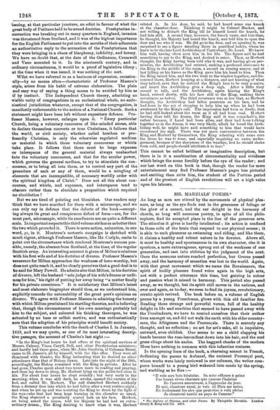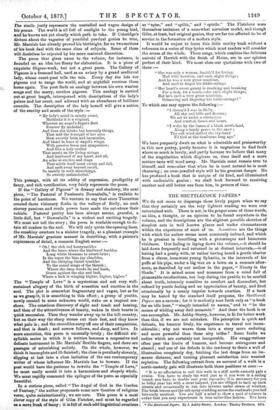MR. MARZIALS' POEMS.*
As long as men are stirred by the movements of physical plea- sure, as long as the eye finds rest in the greenness of foliage or the glow of a sunset, and the ear delight in the harmony of chords, so long will sensuous poetry, in spite of all the philo- sophers, find its accepted place in the line of the generous arts. The stimulus it gives is hardly intellectual ; its action is confined to those cells of the brain that respond to our physical senses ; it is akin to such pleasures as swimming and riding, and like them, it claims a healthy and robust nature in its devotee. Above all, it must be healthy and spontaneous in its own character, else it is spurious, a mere extravagance, sprung out of the weakness of one generation, and cast into oblivion by the judgment of the next. Once the sensuous nature reached perfection, but Greece passed away, and the harmony of sensation was lost to the world. Again, with that great movement which we name the Renaissance, the spirit of bodily pleasure found voice again in the high arts, not with a perfect utterance this time, but gaining in colour and passion what it missed in harmony. This period also passed away, as we thought, but its spirit still moves in the nations, and ever and again, as to-day, we seem to find its joyous, revolutionary, erratic spirit revived. The book before us, a volume of English poems by a young Frenchman, glows with this old familiar fire. Reading these strange and powerful verses, full of the healthy delight in life and sunshine that seemed to have passed away with the Troubadours, we have to remind ourselves that their author lives amongst us, and did not walk the earth with his elder country- men, the Albigenses and the Provencals. There is scarcely any thought, and no reflection ; no art for art's sake, all is impulsive, outward, even childish. One seems to see a child clapping his hands because the rose-leaves float down into his hair, and the cool grass clings about his ancles. The haggard cheeks of the modern Muse have nothing in common with this infantine rosiness.
In the opening lines of the book, a charming sonnet in French, dedicating the poems to Aubanel, the eminent Provencal poet, whose works were lately reviewed in our columns, the writer com- pares himself to a young bird wakened into music by the spring, and warbling as he flies :-
'fl vole aux bola lointains. Sa note effieure h peine Ces beaux reves charmes qua caresse rhaleine
De l'aurore amoureuse, a l'approche du jour. Et moi, chanteur aussi, je vais et Dien me mene, En fredonnant lea airs pre pent-etre a voix pleine Jo chanterai tantot an pays de Famour."
* The Gallery of Pigeons, and other Poems. By Thdopbile Marzials. London Henry S. King and Co. 1873. The simile justly represents the unstudied and vague design of his poems. The world is all full of sunlight to the young bird, and he knows not yet clearly which path to take. If Coleridge's dictum about the vagaries of youthful poetical genius be true, Mr. Marzials has already proved his birthright, for no two sections of his book deal with the same class of subjects. Some of these will doubtless be rejected by his more matured discretion.
The poem that gives name to the volume, for instance, is founded on an idea too flimsy for elaboration. It is a piece of exquisite filigree-work, but not a great poem. The Gallery of Pigeons is a frescoed hall, used as an aviary by a grand medimval lady, whose court-poet tells the tale. Every day she lets her pigeons out to range the world, and at nightfall receives them home again. The poet finds an analogy between his own wanton songs and the merry, careless pigeons. This analogy is carried out at great length, interspersed with descriptions of the lady's palace and her court, and adorned with an abundance of brilliant conceits. The description of the lady herself will give a notion of the suavity and music of the style :—
"My lady's mind is saintly sweet, Methinks it is a virginal, Whereon an angel's fingers fleet Forever fly melodial; And thus she thinks but heavenly things, That mid the tranquil of her eyes Most sweetly brim and harmonise, And blend in hues of angel's wings, With pensive loves and sympathies; And like a holy cordial That music on the living strings And keyboard of my heart, and all, An echo so excites and rings That mirth itself must swoon and fall, And melt away beyond recall, So mutely in such mnsickings, So sweetly melancholial."
This passage, with all its oddity of expression, prodigality of fancy, and rich versification, very fairly represents the poem.
If the "Gallery of Pigeons" is dreamy and shadowy, the next piece, "The Pastoral of Passionate Dowsabella," is realistic to the point of harshness. We venture to say that since Theocritus created those visionary flocks in the valleys of Sicily, no such stormy passions and crude power have made the oat-straw their vehicle. Pastoral poetry has been always serene, graceful, a little dull, but " Dowsabella " is a violent and exciting tragedy. We must ndt tell the story ; the poem is readable enough to de- tain all readers to the end. We will only quote the opening lines, the sunshiny overture to a sinister tragedy, as a pleasant example of Mr. Marzials' gracious manner in describing, with a painter's copiousness of detail, a common English scene:—
"Oh! the rich red honeysuckles
And the lanes wbere the bindweed buckles Long white blossoms to sweet-briar; In the copse the blue jay chuckles, And the chirping linnet truckles To the round songs of the thrush ; Where the deep woods lie and hush, Green against the sky and lush, Where a lark is winging higher, higher, higher."
The "Temple of Love" is a mysterious and not very well- sustained allegory of the birth of sensation and emotion in the sottl. The plot is somewhat fragmentary and vague, but as far as we grasp it, it is something to this effect ; a group of youths, newly created in some unknown world, wake on a tropical sea- shore. The conscious discovery of sight and touch and hearing, and then of the attractiveness of beauty, waken in their hearts in quick succession. Then they wander away up to the hill-country, but on their way the sharp stones cut their feet, and they know what pain is ; and the crocodiles carry off one of their companions, and that is death ; and sorrow follows, and sleep, and love. In mere execution, this poem is unusually lovely ; the difficult six- syllable metre in which it is written becomes a responsive and delicate instrument in Mr. Marzials' flexible fingers, and there are passages of astonishing melody. On the whole, however, we think it incomplete and ill-finished ; the close is peculiarly slovenly, slipping at last into a close imitation of the one contemporary writer of whose influence Mr. Marzials has to beware. If the poet would have the patience to rewrite the "Temple of Love," be must easily mould it into a harmonious and shapely whole. We must rapidly commend the epilogue of the poem as especially beautiful.
In a curious piece, called "The Angel of God in the Garden of Fantasy," the author propounds some new theories of religious verse, quite unintentionally, we are sure. This poem is a most clever copy of the style of Giles Fletcher, and must be regarded as a mere freak of fancy ; it is full of such odd linguistical creations
as "spies," and " spilth," and "spittle." The Fletchers were themselves imitators of a somewhat nerveless model, and though Giles, at least, had original genius, they are far too affected to be of service in the formation of a modern style.
It would be unjust to leave this little motley book without a reference to a series of tiny lyrics which most readers will consider the cream of the whole. These songs, which combine the delicious naivete of Herrick with the finish of Heine, are in our opinion perfect of their kind. We must close our quotations with two of these :—
"She was only a woman, famislid for loving, Mad with devotion, and such slight things; And he was a very great musician,
And used to finger his fiddle-strings.
"Her heart's sweet gamut is cracking and breaking For a look, for a touch,—for such slight things ; But he's such a very great musician, Grimacing and fingering his fiddle-strings !"
To which one may oppose the following :— " I dream'd I was in Sicily,
All sky and hills and flowers ; We sat us under a citron-tree And courted, hours and hours.
"I woke by the dunes of a bleak north-land, Along a lonely grave in the snow ; The salt wind rattled the ivy-band I'd tied at the headstone long ago."
We have purposely dwelt on what is admirable and praiseworthy in this new poetry, partly because it is ungracious to find fault where so much is lovely, and partly because we believe that many of the singularities which displease us, time itself and a more mature taste will weed away. Mr. Marzials must remain true to himself, and remember that when he is most natural he is most charming ; an over-jewelled style will be his greatest danger. He has produced a book that is unique of its kind, and illuminated with undeniable genius ; we shall look forward to receiving another and still better one from him, in process of time.



































 Previous page
Previous page